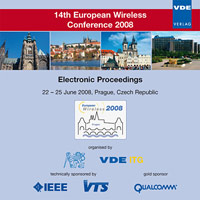Spectral Efficiency vs. Feedback Load in Discrete-Rate Link Adaptation: Is a Zero Information Outage Constraint Optimal or Not?
Conference: European Wireless 2008 - 14th European Wireless Conference
06/22/2008 - 06/25/2008 at Prague, Czech Republic
Proceedings: European Wireless 2008
Pages: 6Language: englishTyp: PDF
Personal VDE Members are entitled to a 10% discount on this title
Authors:
Gjendemsjø, Anders (PricewaterhouseCoopers Advisory, Bergen, Norway,)
Ryhove, Sébastien de la Kethulle de (Electromagnetic Geoservices, Trondheim, Norway)
Øien, Geir E. (Dept. of Electronics and Telecommunications, NTNU, Norway)
Abstract:
We analyze two different approaches found in the literature for throughput maximization of an adaptive transmission system operating over a slowly-varying flat-fading wireless channel with limited channel state information at the transmitter. While both approaches employ a finite number of transmission power levels and capacity-achieving codes, they differ in the number of quantization levels for the channel state, and whether or not information outage is allowed. Focusing on reliable data communications, we extend earlier works in a cross-layered fashion by adding an ARQ protocol, such that data received during such an outage can be retransmitted. We accurately analyze and compare the performance of the two approaches in terms of average spectral efficiency, probability of outage, and average feedback load, here defined in terms of the entropy of the feedback source. Numerical results show that, in general, there is a trade-off between the two approaches in terms of spectral efficiency and feedback load. However, scenarios in which one of the schemes can achieve a higher throughput at a lower feedback load are also identified.


